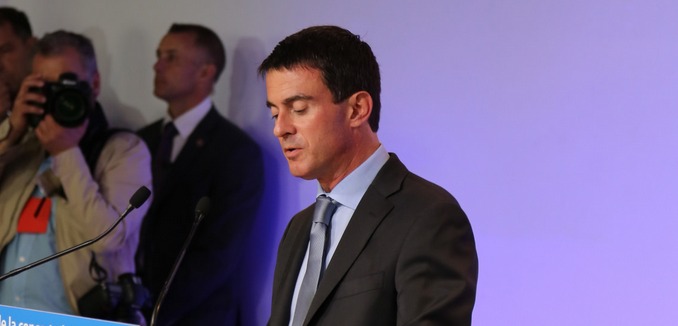French Prime Minister Manuel Valls called on France to renew its fight against anti-semitism in a speech at a Paris synagogue honoring the Jewish New Year, The Times of Israel reported last week.
“There is this rampant Holocaust denial, hatred of Jews who grew up in our neighborhoods … that has contaminated the minds of some of our youth,” Valls said at a Tuesday night event at Paris’s Nazareth synagogue honoring the Jewish New Year.
“Today the fight must be renewed,” Valls said.
Valls’ comments came in the wake of a report showing that anti-semitic attacks in France had increased by 84% in the first five months of 2015, compared to the same period in 2014. In 2014, more than 6,000 French Jews emigrated to Israel and the pace for this year to date is 11% higher.
Valls has been consistent in his identification and condemnation of anti-semitism. Last year, the then-Interior Minister declared that “Criticism of Israel that is based on anti-Zionism — that’s anti-Semitism today, this is the refuge of those who do not accept the State of Israel.” Earlier this year, in the wake of the murderous January 7 attacks on the satirical magazine Charlie Hebdo and Jewish Hyper Cacher supermarket, Valls said in an interview that if Jews leave France, France “will be judged a failure.”
The problem of anti-Semitism in France drew global attention in the wake of the Hyper Cacher attack, as did Valls’ strident words, which were explored at length in Benjamin Kerstein’s Tower essay this past February, “Charlie Hebdo and the Future of Europe.” Speaking at a local synagogue in January, Valls responded to speculation about the possible exodus of Jews from France, declaring:
Without its Jews, France would not be France. … When the Jews of France are attacked, France is attacked, the conscience of humanity is attacked. Let us never forget it.
Even as Valls has strongly condemned anti-semitism, however, his government has been one of the nations strengthening Iran—perhaps the world’s most ardently anti-Semitic regime. Valls has invited Iran’s President Hassan Rouhani to Paris this November. As Ben Cohen, senior editor of The Tower, observed in Global Anti-Semitism Now Has a Leader, which was published in the September 2015 issue of The Tower Magazine, as European leaders move to a rapprochement with Teheran, legitimacy is automatically given to the hatred of Jews that lies at the core of the Islamic revolution that came to power in Iran:
Khomeini’s anti-Semitism, which combined elements of Shi’a theology with the lexicon of European Jew-hatred, remains at the center of the Islamic Republic’s ideology today. In other words, Khamenei’s Palestine, along with his speeches attacking the Jews, their state, and their history, is not simply a hangover from a revolutionary tradition that has been tamed by so-called “moderate” clerics. Instead, it is what defines the Islamic Republic’s approach to foreign affairs.
Moreover, when compared with the experiences of other authoritarian and totalitarian regimes, the “domestic consumption” excuse for Iranian anti-Semitism carries little weight. For Iran to abandon anti-Semitism, the regime would first have to reckon with Khomeini’s legacy, rather as the Soviet Union did with Josef Stalin following his death in 1953. It took three years for Stalin’s successor, Nikita Khrushchev, to appraise Stalin’s crimes, and then only cautiously, in the form of a “secret speech” to the Communist Party’s 20th Congress in 1956. For Iran, even this would be going too far. None of Iran’s clerics have denounced Khomeini’s internal campaign of repression and murder of opponents, much less his anti-Semitism. There are no indications that they ever will, despite the wishful thinking of Western politicians in the weeks that have passed since the nuclear deal was signed.
[Photo: CNNum / Flickr ]




